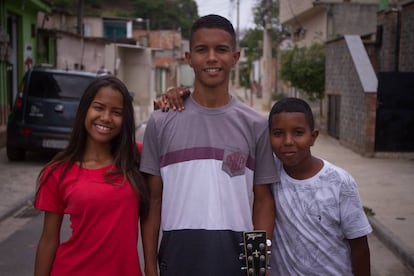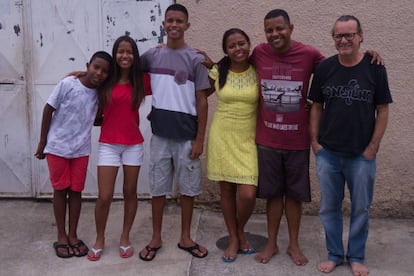The pitch perfect musical siblings discovered on Brazil’s Hope Street
Alex, 18, Laís, 16, and Pedro, 12 all possess a remarkable skill just one in 10,000 people is blessed with


When the bread man pedals into Calle Esperanza (Hope Street), the sound of his bell is no more than a familiar noise for most who live in this rather run-down part of Rio de Janeiro. But for Alex, 18, Laís, 16, and Pedro, 12, the bell is the sound of the note ‘D’ ringing through the neighborhood. And when their father toots the horn on his Fiat – they hear ‘E’. In fact, this trio of pitch-perfect siblings can even identify the note of a pen tapping on the side of a fire extinguisher. And when it comes to actual melodies, even Pedro, the youngest, can tell when someone is singing or playing out of tune.
This rare auditory gift occurs in no more than one in 10,000 people, according to scientific research. Those who have it can identify isolated notes. In the case of the three Santana children, identifying a note is as easy as calling out a color. With training, someone with the skill can reproduce a string of notes or a melody in the correct key after hearing it only once. Bach, Beethoven and Frank Sinatra were all pitch perfect. It is said that when a pig squealed, Mozart would shout out, “G sharp!”
At nine, without knowing anything about music, I started to realize that I could tell when someone was out of key Alex Santana
Perfect pitch is not, however, a gift all musicians are born with. Many would give good money to develop it. “At nine, without knowing anything about music, I started to realize that I could tell when someone was out of key,” says Alex. “It was, and still is, complicated because you end up annoying people. I can’t play if it’s not in the correct pitch.”
Ideally, children gifted in this way should be exposed to music before the age of eight. Unfortunately, the Santana siblings’ gift was discovered late – Newton Motta, a teacher at the local school, stumbled upon it four years ago. First he was astounded by Alex’s musical ear despite the fact he could play no instrument. Then, without realizing they were brothers, he was amazed by Pedro, a sweet giggly boy who knew nothing about music but who passed all Motta’s tests with flying colors. “A person with relative hearing, like myself, is able to reach the note after a lot of training but it’s never a given. These guys never get it wrong,” says Motta.

Studies on perfect pitch began to be carried out a century ago. Scientists believe that while there is a genetic component at play, it is also linked to culture and language. It’s been shown that people who speak a tonal language such as mandarin – where the tone in which the word is spoken determines its meaning – are more likely to be pitch perfect.
What I want is to give them the chance I didn’t have
According to Diana Deutsch, a lecturer at California University who has been working on the phenomenon, there is no doubt that the ability is linked to early musical training. This is not, however, the case with the Santana children, who have grown up in a poor neighborhood rife with armed gangs. With €780 to live on a month, they did not see music classes as a priority. “I would love to be a musician,” says Pedro, who has been bullied at school on account of his abilities. “I want to learn to play the piano or any instrument but since we don’t have the money, I’m thinking of becoming a chemical engineer.”
It took some time for the children’s parents to accept that music could be a viable future for their offspring. But Newton, who grew up in similar circumstances, made sure that they did. “My dream was always to be the director of a big orchestra but I never made it,” he says. “But I didn’t have the potential they have. What I want is to give them the chance I didn’t have.”
English version by Heather Galloway.
Tu suscripción se está usando en otro dispositivo
¿Quieres añadir otro usuario a tu suscripción?
Si continúas leyendo en este dispositivo, no se podrá leer en el otro.
FlechaTu suscripción se está usando en otro dispositivo y solo puedes acceder a EL PAÍS desde un dispositivo a la vez.
Si quieres compartir tu cuenta, cambia tu suscripción a la modalidad Premium, así podrás añadir otro usuario. Cada uno accederá con su propia cuenta de email, lo que os permitirá personalizar vuestra experiencia en EL PAÍS.
¿Tienes una suscripción de empresa? Accede aquí para contratar más cuentas.
En el caso de no saber quién está usando tu cuenta, te recomendamos cambiar tu contraseña aquí.
Si decides continuar compartiendo tu cuenta, este mensaje se mostrará en tu dispositivo y en el de la otra persona que está usando tu cuenta de forma indefinida, afectando a tu experiencia de lectura. Puedes consultar aquí los términos y condiciones de la suscripción digital.








































